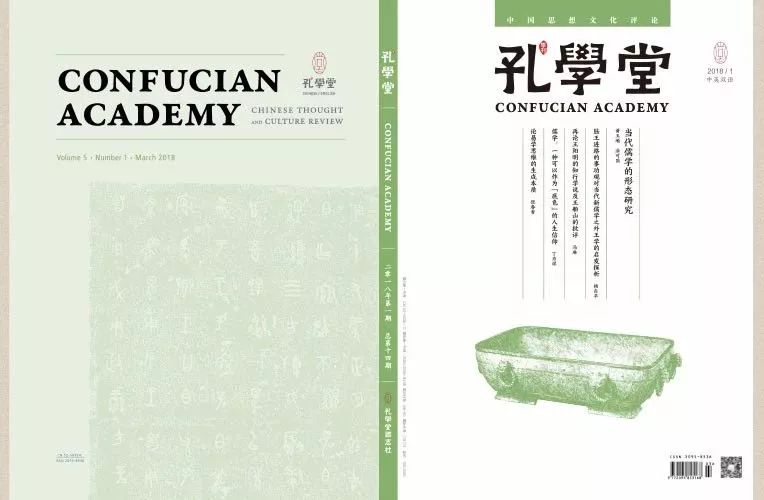


CONFUCIAN ACADEMY
Chinese Thought
and Culture Review
VOLUME 5 ·Number 1 ·March 2018
CONTENTS
SPECIAL THEME: NEW FORMS OF CONTEMPORARY CONFUCIANISM
Introduction to the Special Theme
Huang Yushun
Huang Yushun
Tu Keguo
Yang Tzu-Ping
Feng Lin
EAST ASIAN CONFUCIANISM
Amamura Yuiji and Amamura Kai
Lin Chaochun
ACADEMIC FORUM
Ding Weixiang
Zhang Chunxiang
Chu Lijuan
Introduction to the Special Theme
Huang Yushun
Professor and doctoral supervisor of the Advanced Institute of Confucian Studies at Shandong University
Since the beginning of its modern history, China has undergone “changes unknown for millennia in the past,” to quote the words of Qing politician Li Hongzhang (1823–1901). As the core of traditional Chinese culture, Confucianism has encountered the same situation as modern China, meeting with unprecedented challenges so formidable that they almost put an end to it. However, these challenges turned out to be deadly only to the traditional Confucianism of pre-modern imperial China, and not to the tradition of Confucianism per se. In fact, Confucianism as a tradition itself has been undergoing modernization continuously along with social transformations beginning from the New Culture Movement in 1919. Confucianism has undergone a renaissance as intellectuals have regained their influence by addressing new problems, adopting new methods, putting forth new thoughts and advancing new theories.
So far, two major movements have emerged to modernize Confucianism. The first took place in the twentieth century, and was marked by the rise of Modern New Confucianism (in the general sense) and the prevailing New Confucianism in Hong Kong and Taiwan. The second is the ongoing movement of Contemporary New Confucianism which rose up at the beginning of the twenty-first century and is still gaining in influence now. Leading New Confucians in mainland China (in the general sense) as well as New Confucians overseas including in Western countries have come up with various new theories of their own, among them: political Confucianism (Jiang Qing), affective Confucianism (Meng Peiyuan), life Confucianism (Huang Yushun), post-New Confucianism (Lin Anwu), phenomenological Confucianism (Zhang Xianglong), economic Confucianism (Sheng Hong), institutional Confucianism (Gan Chunsong), cultural Confucianism (Chen Ming et al.), Confucian role ethics (Roger T. Ames), progressive Confucianism (Stephen C. Angle), Confucian exemplary ethics (Wang Qingjie), democratic benevolence (Wu Guang), benevolence ontology (Chen Lai), social Confucianism (Xie Xiaodong, Tu Keguo, Han Xing, et al.). These efforts to construct new forms of Confucianism, as nationalistic expressions of the demand for modernity, embody the character of Confucianism as a tradition that maintains its own internal coherence but also changes with the times. They are telling evidence of the enduring viability of Confucianism, which will undoubtedly have a far-reaching and profound influence on Chinese social reality and the present world, and on the future destiny of mankind.
Two papers on this special theme give general introductions to life Confucianism and cultural Confucianism respectively, one titled “A Retrospective Review of Life Confucianism” by Huang Yushun, and the other, “Cultural Confucianism: A New Form of Contemporary Confucianism” by Tu Keguo. Through this, we hope to raise more discussion on these issues and push forward the modern transformation of Confucianism.